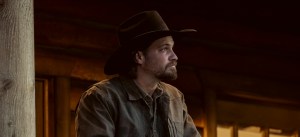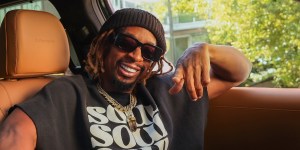Leah Remini got emotional hearing the convoluted truth behind the founder of the Church of Scientology L. Ron Hubbard, a man she once viewed as “a kind of deity,” in this week’s installment of her docuseries Scientology and the Aftermath.
Hubbard published the book Dianetics in 1950, which would become the basis of Scientology. In his writings, Hubbard claims “illness can be cured” and people can break the cycle of death and become “immortal beings.”
Videos by PopCulture.com
Prior to that, he was a science fiction writer and George Washington University dropout, according to journalist Russell Miller, despite his claims that he was one of the United States’ first nuclear physicists.
Miller wrote the biography Bare-Faced Messiah about Hubbard, and said the man was “incapable of telling the truth about himself.”
In addition to lies about his education, Miller uncovered evidence showing that instead of earning 29 combat medals as a U.S. Naval Officer, Hubbard was declared unfit as an officer and never saw heavy combat.
This, Miller says is crucial, because the basis of Hubbard’s “messiah-like” appeal came from his claims that he was able to heal himself after becoming physically disabled and blinded in combat.
When asked about his father’s record in the 1950s, Hubbard’s eldest son told the Clearwater City Council, “I can say flatly that 99 percent of what my father says about [his life] is false.”
The Church of Scientology disputes the claims made in the A&E docuseries.
In 1950, when Hubbard published Dianetics, the book was a smash hit, which Remini said was because at the time people were looking for alternative mental health treatments. In 1952, however, Dianetics clubs fell out of fashion and Hubbard went broke. That same year, he created Scientology and in 1954 created the Church of Scientology.
When interviewed at the time, Hubbard’s son said the church had “always” been a “business.”
“He was motivated by money,” Miller said.
“He had the ability to convince people that he knew what he was doing,” co-host and former Scientologist Mike Rinder echoed. “You get the idea that here is the source of all the answers to everything.”
When Hubbard died in 1986, the coroner’s report listed his cause of death as a stroke, noting that he also had chronic pancreatitis.
However, in an address to the church, current Scientology leader David Miscavige said Hubbard had simply completed his research here on Earth and would continued to do his work “outside the body,” adding that he “discarded the body he used in this lifetime” while of “sound mind and body.”
Remini got emotional thinking that the man who she was “indoctrinated” into thinking “had all the answers” so blatantly would lie to people under such high stakes.
“If he’s just an average man who died of a stroke and sickness, then everything …is a lie,” Remini said. “He has created a religion which has cost people half a million dollars and their lives based on lies.”
Leah Remini: Scientology and the Aftermath airs Tuesdays at 10 p.m. ET. on A&E.
Most Viewed
-

“Zone of Death” – As Kayce tries to embrace his new beginning, a Marshals op to stop a domestic terror attack lands him in a valley of buried Dutton family skeletons. While confronting his past, he must also learn to ingratiate himself with his new Marshals teammates, on MARSHALS, Sunday, March 8 (8:00-9:00 PM, ET/PT). Pictured: Luke Grimes as Kayce Dutton. Photo: Sonja Flemming/CBS ©2025 CBS Broadcasting, Inc. All Rights Reserved.







